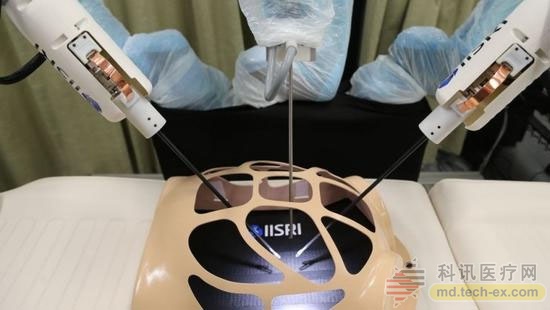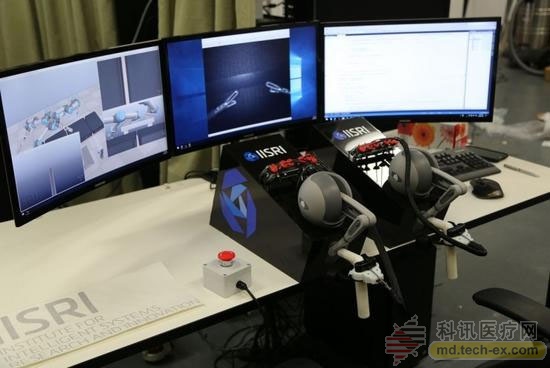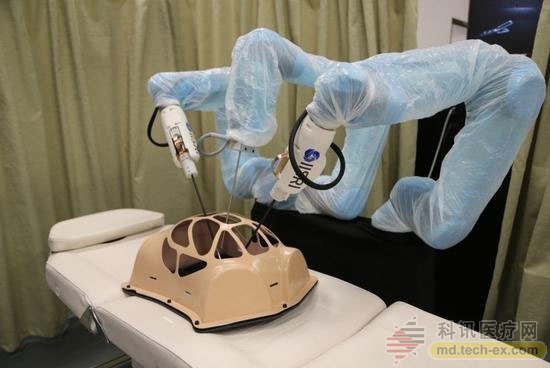Release date: 2016-10-11

In common minimally invasive surgery, because the incision is too small, the surgeons can't wait to stare at the magnifying glass, which has some effect on the surgery itself. To solve this problem, Deakin University of Australia and Harvard University teamed up to create a robot called HeroSurg, which was released yesterday at the Australian Mock Congress in Melbourne.
HeroSurg is specially designed for laparoscopic surgery, so it is especially suitable for those who need to suture tiny tissues. Although the appearance of the patient may be a bit horrified, the R&D team hopes it will make the operation safer and more accurate. More importantly, it gives surgeons an important feeling: touch.
Yes, unlike other minimally invasive surgical tools outside, HeroSurg can pass the tactile sensation to the surgeon and the 3D image processor through a tactile feedback mechanism so that doctors can see their scalpel cut. Where is it? This is a great news for the majority of patients with appendicitis! Because they are always worried that doctors have mistakenly cut their other organs during the operation.

The big boss of this project is called Mohsen Moradi Dalvand, who has spent nearly ten years researching medical robotics and haptic systems. In an interview with Mashable, Dalvand said: "HeroSurg is a master-slave surgical system; when it is subordinate, it is equipped with multiple robotic arms with various surgical tools and laparoscopes; and when it is dominant In terms of status, it becomes a steering handle that provides the surgeon with a sense of touch."
In addition, with HeroSurg, doctors can feel how much force they exert on the patient while using the appliance. “That is, when a doctor grabs something through a surgical instrument or cuts some body tissue, they can feel the strength they exert on the tissue... they can also feel the softness and hardness of the tissue, and The nature of the organization is judged."

“Tactile feedback allows surgeons to distinguish between various tissues and feel whether some fragile tissue is infected or the inflammation is weakened, and then it is more thoroughly dissected.†Professor Suren Krishnan from the Royal Adelaide Hospital Said in a statement.
The robotic surgical system is now very strong and there are more and more doctors using it. Dalvand believes that HeroSurg is so striking because of its tactile feedback capabilities, the ability to avoid collisions, and the ability to automatically adapt to patients and beds. “The surgeon doesn't have to worry about whether the robot will touch the inside or outside of the patient during the procedure,†he explained.
Because this type of robot technology can improve the efficiency and accuracy of surgery, more and more hospitals will introduce it. “The surgeons have been talking about tactile feedback all the time, but the existing systems don’t make them feel the existence of any organization. We hope to make some contributions in this regard,†Dalvand said.
Currently, he and his research and development team are working with Australian surgeons to improve the surgical system through animal testing. In addition, they hope to find business partners and bring this technology to the world. Surprisingly, he didn't want to price the robot directly, because he felt that the price was too sham and it was a bit of a maverick.
Dalvand also said that he hopes to see HeroSurg can be widely used in remote surgery. That is to say, in the future, even if you are separated from the surgeon by a hundred thousand miles, he does not have a clairvoyance, and you can't step on the muscles to see him, but the operation can go smoothly! This is definitely a big leap in the medical system.
Source: Lei Feng Net
For the treatment of diseases of the digestive system:
Many symptoms can signal problems with the GI tract, including: abdominal pain, blood in the stool, bloating, constipation, diarrhea, heartburn, incontinence, nausea and vomiting and difficulty swallowing, according to the NIH.
Among the most widely known diseases of the digestive system is colon cancer. According to the Centers for Disease Control (CDC), 51,783 Americans died from colon cancer in 2011 (the most recent year for available data). Excluding skin cancers, colon and rectal cancer, or colorectal cancer, is the third most common cancer diagnosed in both men and women in the United States, according to the American Cancer Society.
Polyp growth and irregular cells, which may or may not be cancerous, are the most common development paths for colorectal cancers (also referred to as CRC), and can be detected during a routine colonoscopy, according to Dr. John Marks, a gastroenterologist affiliated with the Main Line Health health care system.
[The best news is that, if caught early enough, they can also be removed during the colonoscopy - eliminating the possibility that they grow further and become cancer," Marks said.
For those patients whose cancer has already spread, there are various minimally invasive surgical options that have extremely good prognoses. It is recommended that asymptomatic patients without a family history begin getting tested regularly between the ages 45 and 50, according to Marks. [Symptoms which may suggest that you need a colonoscopy at an earlier age include rectal bleeding and stool/bowel habit changes which last for more than a few days."
While CRC gets a great deal of attention, many diseases and conditions of the digestive system - including irritable bowel syndrome, diverticulitis, GERD (acid reflux) and Crohn`s disease - can be chronic and are difficult to diagnose and treat, according to Dr. Larry Good, a gastroenterologist affiliated with South Nassau Communities Hospital. [With many of these diseases, blood work and colonoscopies all looks normal, so there is an absence of red flags."
Many of the diseases of the digestive system are tied to the foods we eat, and a number of sufferers can reduce their symptoms by restricting their diets, Good said. [Of course no one wants to hear that they can`t eat certain foods, but many times, eliminating acidic things from the diet, such as tomatoes, onions, and red wine, can have an impact," Good said.
There are a number of tests to detect digestive tract ailments. A colonoscopy is the examination of the inside of the colon using a long, flexible, fiber-optic viewing instrument called a colonoscope, according the American Gastroenterological Association. Other testing procedures include upper GI endoscopy, capsule endoscopy, endoscopic retrograde cholangiopancreatography and endoscopic ultrasound.
Digestive System Drug,Domperidone Drug,Metoclopramide Drug,Ranitidine Tablet
NOUVASANT GROUP LTD. , https://www.nouvasant.com